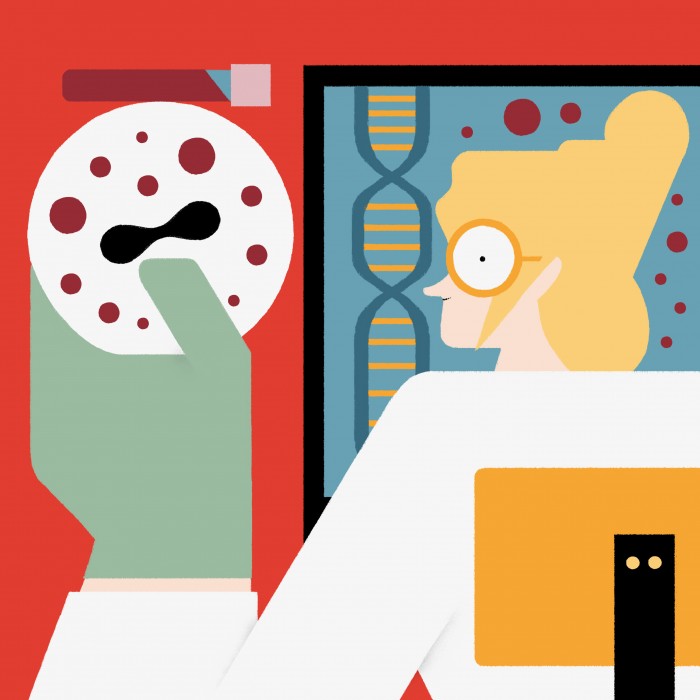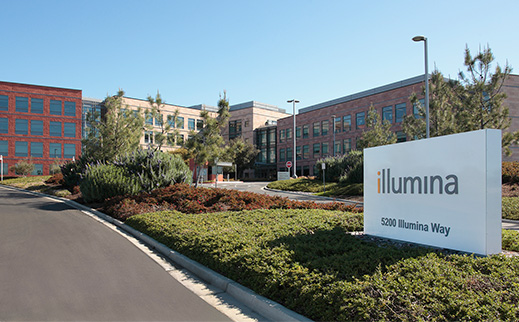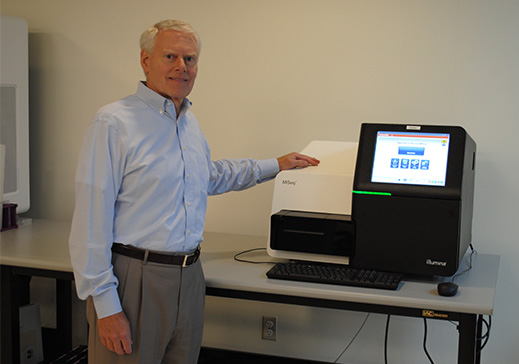Illumina’s Bid to Beat Cancer with DNA Tests
The world’s largest DNA sequencing company says it will form a new company to develop blood tests that cost $1,000 or less and can detect many types of cancer before symptoms arise.
Illumina, based in San Diego, said its blood tests should reach the market by 2019, and would be offered through doctors’ offices or possibly a network of testing centers.
The spin-off’s name, Grail, reflects surging expectations around new types of DNA tests that might do more to defeat cancer than the more than $90 billion spent each year by doctors and hospitals on cancer drugs. Illumina CEO Jay Flatley says he hopes the tests could be a “turning point in the war on cancer.”

The startup will be based in San Francisco and has raised more than $100 million from Illumina as well as Bill Gates, Jeff Bezos’s venture fund, Bezos Expeditions, and Arch Venture Partners. Illumina will retain majority control.
The testing concept being pursued by Illumina, sometimes called a “liquid biopsy,” is to use high-speed DNA sequencing machines to scour a person’s blood for fragments of DNA released by cancer cells. If DNA with cancer-causing mutations is present, it often indicates a tumor is already forming, even if it’s too small to cause symptoms or be seen on an imaging machine.
Illumina didn’t invent the idea for the tests, which were first developed by academic centers including at Johns Hopkins University (see “Spotting Cancer in a Vial of Blood”) and in Hong Kong (see “Liquid Biopsy”). But Flatley says only recently has gene-sequencing become inexpensive enough to try to make the cancer screening tests affordable.

A DNA test able to pick up many kinds of cancer could be revolutionary because tumors caught early can often be cured with surgery or radiation. Since the 1970s, the largest declines in cancer deaths rates are due to either behavioral changes, like declining tobacco use, or because of effective screening tests, principally colonoscopies and pap smear. New drugs have helped, too, though their impact on survival has generally been modest.
Expectations that cancer blood tests will quickly turn into a multibillion-dollar industry has attracted growing interest from investors. For instance, last week, a startup called Guardant, run by former Illumina executives, also said it had raised $100 million.
Guardant’s test isn’t an early detection test, but is instead used to measure tumor DNA in patients already battling cancer and can be prescribed in place of an invasive tissue biopsy (see “The Great Cancer Test Experiment”). Other companies bidding for a share of the testing market include Personal Genome Diagnostics, a spin-off of Johns Hopkins University, as well as Trovagene, Boreal Genomics, and Natera.
In the U.S., the only early-detection liquid biopsy test on the market is from Pathway Genomics, and it costs $699. But since it remains unclear how well these types of tests work, that company received a warning letter from the U.S. Food and Drug Administration questioning its marketing claims (see “Why You Shouldn’t Bother with a $699 Cancer Test”).

Any developer of a presymptomatic screening test for cancer faces daunting obstacles. How often will the test find cancer, and how often will it give a wrong result? What’s more, even tests that do discover cancer early can turn into medical disasters if patients end up getting aggressive and costly treatment for cancers that won’t kill them.
“The hardest part is not only demonstrating the ability to detect cancer early, but being able to say this knowledge is in fact meaningful in terms of patient outcomes,” says J. Leonard Lichtenfeld, deputy chief medical officer of the American Cancer Society. “I can’t tell you how many times we’ve said, ‘Oh, all we have to do is find every cancer early and we would solve the problem.’”
Flatley agrees that most screening tests have failed to help patients and that many companies developing them had suffered reversals as a result. “If you look at this business, it’s littered with failures. With a few exceptions, screening tests have been invariably horrible,” he says. “It’s a big challenge.”
To prove early detection is possible, Flatley says, Grail will spend millions on organizing clinical trials involving as many as 30,000 people. It will test all of them and then see if the tests are able to catch cancer earlier than established methods.
Flatley estimates that the amount of DNA sequencing required for the studies would be the equivalent of decoding the genomes of about 400,000 people at high quality. That makes the project about three times as large as Genomics England, a national effort to study cancer and disease in the U.K.
Flatley says he believes that, right now, Illumina is the only company currently able to implement sequencing technology at a cost that’s low enough to carry out such studies and bring an inexpensive test to market. “In this case, we didn’t think the market could do it fast enough, unless we destroyed our [business] by giving away sequencing,” said Flatley. “We don’t think anyone else can do it at scale. And there are millions of lives at stake.”
Illumina has a price advantage because it makes and sells more than about $2 billion worth of DNA sequencing instruments, chemicals, and test kits annually to university scientists and other labs. But recently it has also sought to jump directly into what it thinks will be key applications for that DNA data. In 2013, it paid almost half a billion dollars to acquire prenatal testing company Verinta (see “Prenatal DNA Sequencing”), and last August said it would partner with investors to create a vast DNA “app store” aimed at consumers. (see “Inside Illumina’s Plans to Lure Consumers with an App Store for Genomes”).
Flatley says Grail’s objective is a “pan-cancer” test able to detect most types of cancer from a single blood draw, but he says early detection of lung and breast cancer could be the first tests to reach the market. Flatley himself says he took an early version of the test, which came back without any problems.
“I was clear,” says Flatley. “But if I have cancer I want to know about it.”
Keep Reading
Most Popular
Large language models can do jaw-dropping things. But nobody knows exactly why.
And that's a problem. Figuring it out is one of the biggest scientific puzzles of our time and a crucial step towards controlling more powerful future models.
The problem with plug-in hybrids? Their drivers.
Plug-in hybrids are often sold as a transition to EVs, but new data from Europe shows we’re still underestimating the emissions they produce.
Google DeepMind’s new generative model makes Super Mario–like games from scratch
Genie learns how to control games by watching hours and hours of video. It could help train next-gen robots too.
How scientists traced a mysterious covid case back to six toilets
When wastewater surveillance turns into a hunt for a single infected individual, the ethics get tricky.
Stay connected
Get the latest updates from
MIT Technology Review
Discover special offers, top stories, upcoming events, and more.